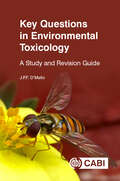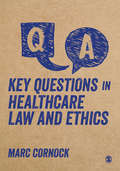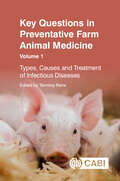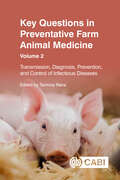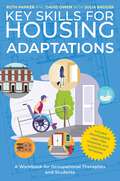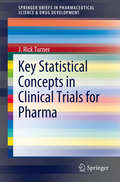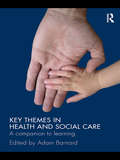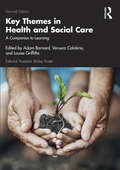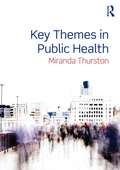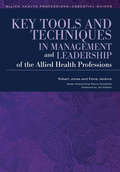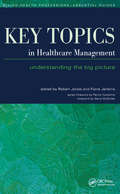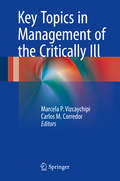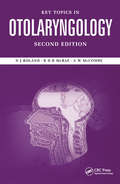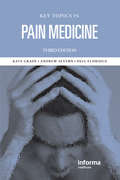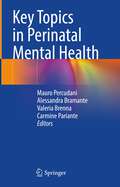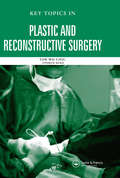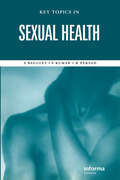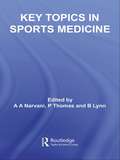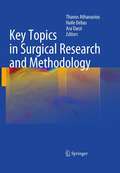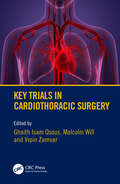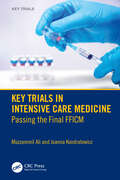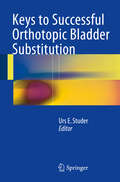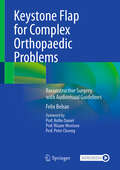- Table View
- List View
Key Questions in Environmental Toxicology: A Study and Revision Guide (Key Questions)
by J P D'MelloKey Questions in Environmental Toxicology is designed as a self-study tool for undergraduate students. Questions review the origin, characterization and environmental distribution of major pollutants, followed by their absorption and metabolic disposition in living organisms. They address implications for the development of cancer, cardiovascular disease, pulmonary dysfunction and neurological conditions in relation to gaseous pollutants, particulates, persistent organic compounds and radioactive emissions, then cover the impact of pollutants on biodiversity, food safety, and water contamination. This book: - Covers toxicology from human morbidity, ecological impact and biodiversity perspectives, and emphasises the impact of diverse organic pollutants in worsening these interconnected phenomena, leading to wider environmental emergencies; - Provides a selection of fill-in-the-gap, multiple choice and short answer question types for students to vary their learning and enhance motivation; - Includes full answer rationales, allowing students to gain true insight into the subject. Providing support to programmes across environmental science, ecology and human health, and covering all the major biological toxins and pollutants as well as unintended consequences of actions designed to improve outcomes, this book may be used in conjunction with the companion volume Introduction to Environmental Toxicology.
Key Questions in Healthcare Law and Ethics
by Marc CornockThe perfect textbook for healthcare students who want a fresh, innovative way to understand how law and ethics relate to their studies, placements, and professional practice. By using a unique format made up of frequently asked questions and corresponding answers, Key Questions in Healthcare covers the what, why, where and how in legal and ethical issues related to healthcare. Its easy-to-use layout helps you quickly find informative yet straightforward answers to over 150 questions, helping you to feel confident in your legal and ethical knowledge, without leaving you overwhelmed or confused. All answers are written in-line with Nursing and Healthcare regulations and its conversational writing style will make you feel like you are talking with a lecturer, instructor, or knowledgeable colleague, rather than reading a textbook. The book is appropriate for all levels, from healthcare students in the initial stages of their education, to the advanced practitioner who wishes to refresh their knowledge, or maybe learn something new.
Key Questions in Healthcare Law and Ethics
by Marc CornockThe perfect textbook for healthcare students who want a fresh, innovative way to understand how law and ethics relate to their studies, placements, and professional practice. By using a unique format made up of frequently asked questions and corresponding answers, Key Questions in Healthcare covers the what, why, where and how in legal and ethical issues related to healthcare. Its easy-to-use layout helps you quickly find informative yet straightforward answers to over 150 questions, helping you to feel confident in your legal and ethical knowledge, without leaving you overwhelmed or confused. All answers are written in-line with Nursing and Healthcare regulations and its conversational writing style will make you feel like you are talking with a lecturer, instructor, or knowledgeable colleague, rather than reading a textbook. The book is appropriate for all levels, from healthcare students in the initial stages of their education, to the advanced practitioner who wishes to refresh their knowledge, or maybe learn something new.
Key Questions in Preventative Farm Animal Medicine, Volume 1: Types, Causes and Treatment of Infectious Diseases (Key Questions)
by Chetan D. Chavda Bhupamani Das Aishwarya Dash H. Dhanalakshmi Abrar Ul Haq Biswa Ranjan Jena J. Jyothi Jaysukh B. Kathiriya M. Bhavya Sree Sivajothi SrigireddyProviding well over 1,000 questions to test your knowledge of preventative farm animal medicine, the book has been produced in a convenient format so that it can be used at any time in any place. Each chapter starts with a brief introduction to the topic before providing relevant multiple-choice questions. Covering preventative veterinary medicine for common livestock species, the book includes questions on: - general concepts of preventative medicine; - viral, bacterial, fungal and mycoplasma diseases; - ecto- and endo-parasitic infections. This self-test resource for students provides a convenient and useful current source of information to anyone interested in learning, revising and assessing their knowledge.
Key Questions in Preventative Farm Animal Medicine, Volume 2: Transmission, Diagnosis, Prevention, and Control of Infectious Diseases (Key Questions)
by Anil Kumar Surbhi Gupta Sonam Bhatt Snehil Gupta Sushma Gupta K. Jayalakshmi K. Karthika Simant Kumar Nanda Arpita Padhy Abhishek Pathak Jigar Raval Amit Ranjan Sahu Rajesh Kumar Sahu Barkha Sharma Jitendra TiwariProviding well over 1,000 questions to test your knowledge of preventative farm animal medicine, the book has been produced in a convenient format so that it can be used at any time in any place. Each chapter starts with a brief introduction to the topic before providing relevant multiple-choice questions. Covering preventative veterinary medicine for common livestock species, the book includes questions about: - rickettsial and protozoan diseases; - prophylaxis in animals; - diagnostic techniques; - collection, preservation, processing and dispatch of clinical materials. Including a full chapter considering important transboundary, emerging and exotic diseases, this self-test resource for students provides a convenient and useful current source of information to anyone interested in learning, revising and assessing their knowledge.
Key Skills for Housing Adaptations: A Workbook for Occupational Therapists and Students
by David Owen Ruth Parker Julia BadgerKey Skills for Housing Adaptations delves into the crucial role occupational therapists play in helping people with additional needs adapt their homes in order to give them a better quality of life. Highlighting the long-term benefits environmental adjustments can afford, this accessible and practical book combines key skills needed to carry out home adaptations, from professional reasoning skills and cultural considerations to relevant legislation and the roles and remits of people working in the field.Supplemented with knowledge checks preceding every chapter, practical exercises, and case studies as well as digital resources including examples of architectural plans and videos that bring the theory to life, this is a comprehensive and essential tool for both new and seasoned occupational therapists looking to make a positive impact on clients' home lives.
Key Statistical Concepts in Clinical Trials for Pharma
by J. Rick TurnerThis Brief discusses key statistical concepts that facilitate the inferential analysis of data collected from a group of individuals participating in a pharmaceutical clinical trial, the estimation of their clinical significance in the general population of individuals likely to be prescribed the drug if approved, and the related decision-making that occurs at both the public health level (by regulatory agencies when deciding whether or not to approve a new drug for marketing) and the individual patient level (by physicians and their patients when deciding whether or not the patient should be prescribed a drug that is on the market). These concepts include drug safety and efficacy, statistical significance, clinical significance, and benefit-risk balance.
Key Themes in Health and Social Care: A Companion to Learning
by Adam BarnardKey Themes in Health and Social Care is a learning resource for students in health and social care. It provides an overview of foundational issues and core themes in the field and introduces key areas of debate, moving from an introductory level to in-depth discussion as the book progresses. Divided into three parts: the first part sets the scene, addressing introductory psychology and sociology, social policy, equality and diversity, skills for practice, and working with people the second part considers key themes such as the contribution of philosophy and politics; criminal justice; management of services; the relationship between place and wellbeing; research in health and social care; theories of counselling; housing and the built environment the third part looks at discrete areas of practice such as mental health; substance abuse, protection work; health promotion; disability studies; working with men; child welfare and public responsibility. Each chapter begins with an outline of the content and learning outcomes and includes reflective exercises to allow students to reflect on what they have read, review their learning and consolidate their understanding. Time-pressed readers wanting to ‘dip into’ the book for relevant areas can do so but, read from cover to cover, the book provides a comprehensive introduction to the key areas of contemporary health and social care practice. It will be particularly helpful for students undertaking health and social care undergraduate and foundation degrees.
Key Themes in Health and Social Care: A Companion to Learning
by Adam Barnard Verusca Calabria Louise GriffithsThis revised and expanded second edition of Key Themes in Health and Social Care is a learning resource for students in health and social care. It provides an overview of foundational issues and core themes in the field and introduces key areas of debate, moving from an introductory level to in-depth discussion as the book progresses. Divided into three parts: the first part sets the scene, addressing introductory psychology and sociology, social policy, equality and diversity, skills for practice, and working with people the second part considers key themes such as mental health and wellbeing; management of services; the relationship between place and wellbeing; research in health and social care; and person-centred interventions the third part looks at discrete areas of practice such as mental health; ageing, leading and managing health and social care; working with vulnerable populations; and health promotion Each chapter begins with an outline of the content and learning outcomes and includes reflective exercises to allow students to reflect on what they have read, review their learning and consolidate their understanding. Time-pressed readers wanting to ‘dip into’ the book for relevant areas can do so but, read from cover to cover, the book provides a comprehensive introduction to the key areas of contemporary health and social care practice. It will be particularly helpful for students undertaking health and social care undergraduate and foundation degrees.
Key Themes in Public Health
by Miranda Thurston‘The growth of public health courses aimed at undergraduates has created a new need for textbooks that are appropriate and stimulating. Miranda Thurston has succeeded in producing something which strikes the right note. It is wide ranging in scope without being superficial and is accessible to the young learner. It is a sort of 'Wiki'. Just what the aspiring public health practitioner ordered.’ – Professor John R. Ashton C.B.E., President of the UK Faculty of Public Health. Key Themes in Public Health comprises a series of introductory essays exploring key themes and concepts in public health. Ranging from political and economic concern with improving population health and reducing health inequalities, to debates about how to protect populations from new health threats, as well as a concern with individual responsibility for lifestyles and behaviour, the themes discussed include: determinants of health, globalisation, evidence, climate change, ethics, development, poverty, risk and population. Presenting provocative ways of thinking about key ideas in a concise fashion, each essay provides a basic grounding in the relevant theme as well as a departure point for further study by: Defining the theme in an accessible way Placing each idea in its particular social, political, economic and historical context Illustrating its application and significance for public health Identifying and exploring issues surrounding each of the themes This text provides an accessible overview for students new to public health who want to get to grips with the full range and complexity of this diverse and multidisciplinary field.
Key Tools and Techniques in Management and Leadership of the Allied Health Professions
by Robert Jones Fiona JenkinsThe Allied Health Professions - Essential Guides series is unique in providing advice on management, leadership and development for those in the Allied Health Professions (AHP). This highly practical volume offers a wide range of assessment tools and techniques in such critical areas as management quality, organisational and management structure, benchmarking, capacity and demand management, care pathway design, activity analysis, report writing and presentation skills. The layout is conducive to easy comprehension; tables, figures and boxed text aid quick reference and everyday application, and many of the resources are also provided on a complimentary CD. With contributions from internationally renowned professionals Key tools and techniques in management and leadership of the allied health professions provides tools that will be vital to all allied health professionals interested in providing timely, efficient and cost-effective care for their patients. These will include AHP managers and aspiring managers, senior clinicians, extended scope practitioners, clinical specialists, AHP educators, researchers, staff and students. 'The NHS is facing the greatest period of challenge in its history. The key to success is leadership. Allied Health Professionals will be a central part of this leadership response. In this work, Robert and Fiona continue their series supporting Allied Health Professionals in that leadership journey. It is an important contribution to this critical effort.' From the Foreword by Jim Easton
Key Topics in Healthcare Management: Understanding the Big Picture (Radcliffe Ser.)
by Robert Jones Fiona JenkinsInformation is a key resource to primary health care and is increasingly required in individual practices. This book will demystify the subject, which is often presented in complex terms. It sets out in a simple and interesting way what information those working in primary care will need, the systems required to deliver them and how to set them up. Information and IT for Primary Care uses exercises, stories, key points, case studies, model answers and think boxes. Worldwide web links refers the reader to resources and shows how to get the most out of your computer. The book is user-friendly, jargon free and based on primary research evidence. It is essential reading for everyone working in primary care organisations including GPs, practice managers and nurses, and staff working in community trusts and the NHS.
Key Topics in Management of the Critically Ill
by Marcela P. Vizcaychipi Carlos M. CorredorThis book is designed to assist clinicians who are new to intensive care by providing information on a range of important and novel topics of relevance in the day-to-day management of critically ill patients. Guidance is given on the appropriate response to various emergencies and circumstances, including stroke, acute liver failure, severe burns, extreme pain, and delirium. The role of simulation training in the intensive care unit is discussed, and detailed attention is devoted to the application of modern techniques for the assessment of vital organs in the critical care setting, such as echocardiography and lung ultrasound. An individual chapter focuses on regional anesthesia in intensive care, and in addition the book addresses subjects and issues that are frequently neglected. Examples include transfer of the critically ill patient, the role of forgotten electrolytes such as magnesium, the use of non-coumarin anticoagulants, and neuropsychological rehabilitation. The book will have broad appeal, including for general intensivists, anesthetists, acute medicine physicians, and medical students attached to acute specialties or preparing for exams in intensive care medicine.
Key Topics in Otolaryngology
by Nj. Roland R.D.R. Mcrae A. W. MccombeKey Topics in Otolaryngology second edition provides essential information on 100 major subjects pertinent to modern clinical practice in otolaryngology and head and neck surgery. This edition has been comprehensively updated to reflect recent changes in the field. It contains new chapters on medicolegal issues in ENT surgery, clinical governance a
Key Topics in Pain Management
by Kate M. Grady Andrew M. SevernThe Third Edition of this best-selling guide to the Key Topics in Chronic Pain has now expanded its remit to include material on acute pain management also. In addition, the existing material has been completely updated to reflect new activity in the field of anti-inflammatory drugs and physiotherapy, amongst other topics.
Key Topics in Perinatal Mental Health
by Mauro Percudani Alessandra Bramante Valeria Brenna Carmine ParianteThe book offers a comprehensive and up-to-date overview of key issues in perinatal mental health. Classic topics such as screening, assessment, pharmacological, psychological and psychosocial interventions of the most common conditions (depression, anxiety disorders, etc.) are combined with lesser known issues, such as mother-infant relationship disorders or thoughts of infant-related harm and aggressive behaviors, sleep disturbances in puerperium, obsessional disorders, fetal death etc., paying particular attention to specific groups of perinatal patients like mothers with cancer, adolescents, fathers, migrants, and preterm babies. The chapters written by health professionals working in hospitals, community services or voluntary agencies alternate with contributions from researchers whose fields of expertise include biology and neuroscience, diagnosis and special needs, treatment and prognosis, etc., striking a balance between scientific investigation and clinical practice.The book offers a valuable tool for a wide range of professionals like psychiatrists, psychologists, gynecologists, midwives, oncologists, pediatricians, and social workers, who want to improve their clinical practice and the effectiveness of their treatment pathways using evidence from perinatal health research.
Key Topics in Plastic and Reconstructive Surgery
by Tor Wo Chiu Andrew BurdBased on the teaching of plastic and reconstructive surgery at a university hospital, Key Topics in Plastic and Reconstructive Surgery is a unique resource that provides succinct guidance to the core topics in this rapidly developing field for all student surgeons. Using clear, descriptive prose and illustrations as necessary to explain the importa
Key Topics in Sexual Health
by Sunil Kumar Raj Persad Steve BaguleyThis impeccably researched text provides the reader with a comprehensive overview of sexual health, exploring a range of topics such as:sexually transmitted infectionscontraceptionurological conditionsgenital dermatosessexual dysfunctionnovel therapeutic options.With a clear, symptom-based format, this is an ideal quick reference guide for the consulting room and the ward.
Key Topics in Sports Medicine
by A A Narvani P Thomas B LynnStudents have often commented on the need for a concise textbook on sports medicine that presents the essential information otherwise scattered across several much larger medical textbooks on other topics. Addressing this need, Key Topics in Sports Medicine makes effective use of the successful Key Topics format to provide extensive relevant information in an accessible and easy-to-follow manner. Practical and clearly presented, this is an invaluable resource for those students and practioners of sports medicine and rehabilitation, athletic training, physiotherapy and orthopedic surgery.
Key Topics in Surgical Research and Methodology
by Ara Darzi Thanos Athanasiou H. DebasKey Topics in Surgical Research and Methodology represents a comprehensive reference text accessible to the surgeon embarking on an academic career. Key themes emphasize and summarize the text. Four key elements are covered, i.e. Surgical Research, Research Methodology, Practical Problems and Solutions on Research as well as Recent Developments and Future Prospects in Surgical Research and Practice.
Key Trials in Cardiothoracic Surgery
by Ghaith Isam Qsous Malcolm Will Vipin ZamvarA concise summary of the most important clinical trials in cardiac and thoracic surgery. The focus is on how evidence-based decision making has helped to shape modern practice and guidelines. The key trials are described and an overview of their impact provided. Much research has been undertaken to study the efficacy of different drugs, techniques, and treatment strategies within cardiothoracic surgery. As a result, many randomised controlled trials have been published which discuss a wide variety of topics and with the intention of improving current practice and patient care. This volume presents a selection of the key trials and assesses their impact. Compact and easy to read, the distillation of core information will enable the reader to understand the importance of the key papers that have influenced best practice across operating theatres, clinics, multi-disciplinary meetings, and inpatient management. Including full summaries of more than 30 trials and reflecting the clinical scenarios encountered in everyday practice by cardiothoracic surgeons, this concise volume is written for both trainee and more experienced members of the surgical team.
Key Trials in Intensive Care Medicine: Passing the Final FFICM (Key Trials)
by Muzzammil Ali Joanna KondratowiczThis essential guide encompasses over 160 pivotal papers critical for doctors preparing for postgraduate exams in intensive care, interviews, or commencing an intensive care rotation. Chosen for their educational merit and significant influence on intensive care medicine, these key trials, studies, and meta-analyses are distilled into succinct, easy-to-read summaries.The guide steers clear of intricate numerical details and statistical analyses, concentrating instead on the core information necessary to comprehend the significance of these influential papers. Tailored specifically for the OSCE and SOE components of exams like the Final FFICM and EDIC, it provides concise summaries and key results, focusing on the most crucial information for exam success.Serving as a resource that underpins the evidence base of contemporary intensive care clinical practice, these summaries are an indispensable tool for both exam preparation and ongoing professional development in intensive care medicine.
Keys to Successful Orthotopic Bladder Substitution
by Urs E. StuderThis book provides clear guidance on how to achieve excellent functional results and avoid failures when performing cystectomy and orthotopic bladder substitution. The opening sections present helpful checklists relating to patient selection, preoperative management, the procedures themselves, intraoperative measures, postoperative management, and actions to be taken in the event of various symptoms and complications. The remainder of the book focuses in detail on a variety of specific points of interest such as how and why to attempt a nerve-sparing cystectomy, the role of pelvic lymph node dissection, physical and physiological considerations relevant to reservoir construction, metabolic consequences of the incorporation of bowel into the urinary tract, preservation of renal function, and quality of life issues. The information provided may not only be instrumental to urologists, but also to specialized health care professionals, as well as the concerned patients.
Keys to the Trematoda, Volume 3
by David Gibson David Blair John Pearson Arlene Jones Stephane Deblock R Madhavi Tomas Scholz Diane Barton Thomas Cribb S Pozdnyakov T Pojmañska Vasyl Tkach Ronald Campbell William Font Jeffrey Lotz C Santos Rodney Bray Terrence MillerThis is the third of three volumes of Keys to the Trematoda, a series on the systematics and identification of the Class Trematoda. It covers five superfamilies with the Order Plagiorchiida and the family Didymozoidae, with the keys for their identification at the family, subfamily and generic levels. It also includes a key to all dignean superfamilies, including those treated in detail in volumes oneand two.
Keystone Flap for Complex Orthopaedic Problems: Reconstructive Surgery with Audiovisual Guidelines
by Felix BehanKDPIF, or Keystone Design Perforator Island Flap, is the main reconstructive tool available as a valid alternative to microsurgical procedures; its low complication rate is the key to its surgical success. This stepwise guide illustrates the technique’s applications in orthopaedic reconstruction. The sections of the book cover the upper limb (including Dupuytren’s disease), the lower limb defects (from groin to foot) and the rare vascular complications of the technique. The illustrations range from simple to complex cases in an easy-to-follow format, with audio files, acting as a supplementary tool to amplify and illustrate the technique to enhance the reader’s experience and foster clear understanding. The basic design format for all Keystones are highlighted, all sitting within the dermatomal precincts. The KDPIF must contain a fascial base for lining and must be aligned within the dermatomal precincts. This island outline is an essential pre-requisite for its success. It is hypothesized that this islanding creates a sympathectomy effect resulting in hyperaemic blood flow which optimises healing: the KDPIF technique provides an alternative to microvascular procedures where the biggest drawback is tissue match. The KDPIF addresses this problem admirably with a low pain component, an excellent aesthetic match with a low vascular complication rate and executed in an expeditious manner with sensory recovery and resolution of oedema. Keystone Flap for Complex Orthopaedic Problems: Reconstructive Surgery with Audiovisual Guidelines will be a valued companion to plastic and reconstructive surgeons and orthopaedic surgeons, that might find a valid alternative to microsurgical techniques.
